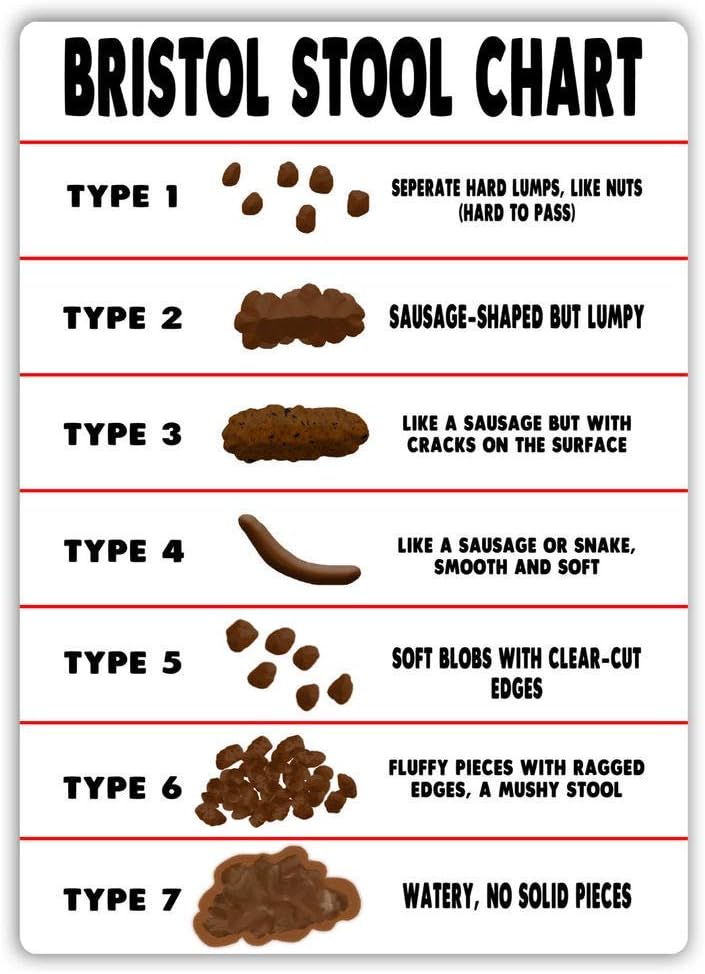Women’s health #podcastpick
From The Balanced Bites Podcast Episode 31 Women’s Wellness Part 1 & Episode 32 Women’s Wellness Part 2. You can listen here. These two episodes were a Q&A with the hosts, below were my key takeaways:
Bone broth– use any way you like to get benefits. Drink it alone, cook with it, use it in soups/stews.
Poop
Do you struggle with irregular bowel movements and want to know what to do?
Engage your parasympathetic nervous system before meals: take 3 deep breaths when you sit down for your meal. Breathe in for 4 seconds, hold for 7 seconds, breathe out for 8 seconds. Take deep breaths randomly throughout the day.
Get up and move, especially if you work at a desk all day.
Focus on your food—always eat at a table, don’t multitask during meals/watch tv.
Chew your food more than you think is necessary; digestion begins in the mouth.
Incorporate probiotic foods: fermented vegetables, kombucha, yogurt, kefir, miso, pickles

From the chart above, we want to see bowel movements like type 4: smooth, soft, & formed.
Bacteria is the largest component of our poop, so you have to have bacteria present to expel, this is soluble fiber. Soluble fiber sources: Sweet potato, white potato flesh, bananas, plantains, squash, butternut squash.
Make sure you are not dehydrated, drink water in between meals (not a lot at meals as this dilutes stomach acid).
Home check of your transit time (how long it takes to eliminate what you’re eating right now): following a meal swallow 2 teaspoons of whole sesame seeds with some water, mark down the time, and then mark down when you see them come out in your poop. 18-24hrs is a healthy transit time.
Stubborn Weight Loss
Book recommendation: How to Eat, Move, & Be Healthy
Birth control/Family Planning & Hormones
Child spacing, recommended 2-3 years (wow, so not for me). If having children closer together, especially if breastfeeding, ensure that you are consuming a really nutrient dense diet.
How sugar consumption effects cycle length & regularity- high sugar/carbohydrate/processed food intake will bog down the liver due to its role in blood sugar regulation. The liver also plays a role in the conjugation of hormones. The resulting bog down from blood sugar regulation makes it harder to clear hormones from your body as needed. The liver helps convert estrogen to its metabolite which allows for its excretion. If estrogen is not properly excreted, then the estrogen/progesterone ratio will be off.
While on your period your magnesium level may dip, taking a magnesium supplement may help with cramps.
If your body is under too much stress (from any cause), your cortisol levels are high. Your body will prioritize that stress hormone production & neglect your sex hormone production which leads to irregular cycles. This happens because high cortisol results in decreased DHEA production which is needed to produce your sex hormones.
PMDD (premenstrual dysphoric disorder)—correction must start with dietary changes because it is typically the diet consumption (standard American diet) that is the root problem. The high insulin levels are causing the hormonal imbalance, not the other way around.
Hypothyroid-if caused by autoimmune (hashimotos), then you need to be gluten free 100% of the time
Six months prior to trying to conceive both partners should begin consuming a very nutrient dense diet.
Ensure that you are getting enough folate (not folic acid), folate comes from beef & liver.
-Folate: leafy green veggies, cooked lentils, broccoli, cantaloupe, oranges, avocados
-Choline is important and is found in egg yolks.
-All fat-soluble vitamins (A, D, E, and K)
-Vitamin A: cheese, milk, sweet potato, spinach, carrots, black-eyed peas
-Vitamin D: milk, eggs, oily fish
-Vitamin E: sunflower seeds, almonds, peanuts, broccoli, spinach, kiwi, mango
-Vitamin K: kale, spinach, egg yolks
Biotin: liver, egg yolks, nuts, seeds, sweet potatoes
DHA: fatty fish, Glycine-bone broth, chia seeds, walnuts, kidney beans
- Seed Cycling: Your Guide to Improved Fertility and Hormonal Health
- Understanding HTMA Retesting and its Impact on Optimal Health
- Navigating Holiday Indulgences: Tips for a Balanced Approach
- Guiding Your Child: Fostering a Healthy Relationship with Food
- Investing in Your Health: The Right Time and Approach

